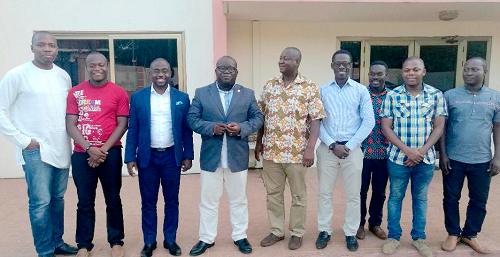
NCR calls for debate on Interconnect Clearing House to assess its relevance
The Network of Communications Reporters (NCR) has called for a debate on the relevance of Interconnect Clearing House (ICH) to the telecom industry.
According to the NCR, the operations of the ICH are not clear and after a couple of years in existence, its relevance needed to be evaluated to ascertain its worth.
The Dean of the NCR, Mr Charles Benoni Okine, who made the call when he led a delegation from the network to pay a courtesy call on the new Chief Executive Officer of the Ghana Chamber of Telecommunications, Mr Kenneth Edem Ashigbey, said, “We introduce bodies and policies within the telecom sector with haste but we never monitor and evaluate their value to either ascertain their relevance or otherwise”.
The visit formed part of efforts by the NCR to engage key stakeholders in the telecom industry to see how best the industry could ensure quality of service for its customers, thereby helping the state to generate more revenue while creating employment avenues for the people. It was also to ensure that telcos had a positive return on their investments.
According to him, the existence of the ICH seemed more like a financial drain than a means to help generate revenue and asked for a sober debate on the issue to set the records straight in the interest of the stakeholders.
Mr Okine also prevailed on the chamber to see how best to address the numerous challenges that customers of the various telecom networks faced in the country.
“We want to remind you of the challenges that customers of telecom services continue to face and these include the same old call drops we have been talking about, delays in call set up times, disappearance of data and call credit after loading, cyber fraud and the dangerous citing of Masts among many others,” he said.
Mr Okine also bemoaned the refusal of the telecom companies to insist on having SIM cards registered with valid identity cards.
“We have evidence to show that the vendors of these telcos are registering SIM cards without checking the IDs; in some instances, SIM cards are being sold without registration in their own customer service centres and this practice is most unfortunate,” Mr Okine said.
Responses
Mr Ashigbey said although the telcos were committed to addressing the SIM card registration issue, many of the various IDs used for the registration could not be fully trusted.
He said the chamber was, therefore, looking into using one primary identification card, which was the national identification card, for the SIM card registration.
He explained that the challenges the telcos had in siting masts were as a result of the lack of high-rise buildings in the country as was the case in many developing countries.
He also complained about the high charges from the various assemblies when telcos decided to mount their masts within their jurisdiction, saying: “we are ready and willing to mount the masts taking into consideration all the safety precautions but the rates charged are also prohibitive.”
MoMo for national development
Mr Ashigbey said one of the conversations the chamber intended to have with its stakeholders and the larger media fraternity was the issue regarding how the public could be made to use Mobile Money (MoMo) to honour their tax obligations.
“That is a conversation that will bring everybody to the table to think through how to use mobile money to drive the economy, “he said.
According to him, more internal revenue could be generated if the government identified the importance of mobile money, especially in the collection of taxes.